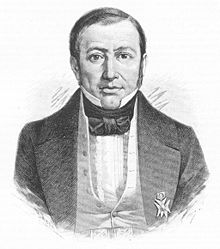Mariano Paredes y Arrillaga
| Mariano Paredes | |
|---|---|
 |
|
|
15th President of Mexico |
|
|
In office 31 December 1845 – 28 July 1846 |
|
| Vice President | Nicolás Bravo |
| Preceded by | José Joaquín de Herrera |
| Succeeded by | Nicolás Bravo |
| Personal details | |
| Born | c. 7 January 1797 Mexico City |
| Died | 7 September 1849 Mexico City |
| Nationality | Mexican |
| Political party | Conservative |
| Spouse(s) | Josefa Cortés |
Mariano Paredes y Arrillaga (c. 7 January 1797 – 7 September 1849) was a Conservative Mexican general and president. He took power via a coup d'état in 1846. He was the president at the start of the Mexican–American War.
He entered the Spanish colonial army as an infantry cadet on 6 January 1812. He participated in 22 actions in the Mexican War of Independence on the Spanish side. He was arrested for criticizing King Ferdinand VII and sentenced to exile to Spain. However, he escaped imprisonment and remained in Mexico. He joined the Ejército Trigarante, where he participated in another 11 military actions. In June 1821, under the First Mexican Empire, he was made a lieutenant colonel.
On 11 February 1823, when he was then in charge of the plaza of Puebla, he pronounced against the empire of Agustín de Iturbide (the Plan de Casa Mata). He rose in revolt again on 21 December 1829, this time from Guadalajara in support of Anastasio Bustamante's in opposition to President Vicente Guerrero. Bustamante took power the following 1 January.
In 1832, Paredes was promoted to brigadier general. He entered the political field in 1835. Briefly in December 1838, he was minister of war. In 1839, he helped Jalisco Governor Escobedo suppress the federalist revolt of 18 May.
On 8 August 1841, he headed a reactionary revolt against the regime of conservative President Bustamante, whom he accused of not fighting to recover Texas and yielding to the French invasion in the Pastry War. He, Antonio López de Santa Anna and other rebels signed the against Bustamante on 28 September 1841. Bustamante agreed to resign, Francisco Javier Echeverría was chosen interim president, and three weeks later Santa Anna occupied the presidency. Paredes was not included in the new cabinet, and he felt he had received inadequate reward for his support. A strong follower of Santa Anna before this point, his support now began to cool.
...
Wikipedia
